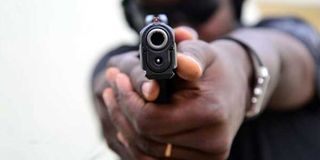Police shooting ‘criminals’ dead imprudent way to reduce crime

A junior police officer attached to Kongoni Police Station in the outskirts of Naivasha Town shot and killed his 31-year-old lover following a disagreement. PHOTO | FILE | NATION MEDIA GROUP
What you need to know:
The role of the police is to apprehend suspects and hand them over to the Prosecution and the Judiciary, whose role it is to punish offenders.
An innocent suspect wrongfully killed will not have the opportunity to put things right as they are not alive to defend themselves in court.
It is unfair to the police themselves when one group is charged with murder for using excessive force on ‘criminals’ and another lauded for killing ‘criminals’.
When his victory was nullified last year, President Uhuru Kenyatta did not — rightfully — hold back in his offensive towards the Judiciary, which, too, had its right to stay firm.
The tension between the Executive and the Judiciary would be laid bare by Miguna Miguna’s case when court orders were flouted left, right and centre by the Executive. This kind of tension is created when one arm of the government tries to depart from the rule of separation of powers.
Nonetheless, such belligerents would have a chance to challenge the status quo by going back to Parliament for amendments to the law or appeal and counter-appeal.
The separation of powers as fought over by the Executive and the Judiciary is not visible in other areas of governance, however, such as the criminal justice system.
Take, for example, the police, who have clearly usurped the powers of the Judiciary in passing the ‘death sentence’ to suspects.
APPREHEND SUSPECTS
The role of the police is to apprehend suspects and hand them over to the Prosecution and the Judiciary, whose role it is to punish offenders. Letting the police shoot suspects to death in the absence of due process of the law leaves us exposed to miscarriage of justice. No one is safe. The reasoning behind the shooting does not hold water at all.
How can the police justify fatally shooting someone for just suspecting them of plotting a crime? An innocent suspect wrongfully killed will not have the opportunity to put things right as they are not alive to defend themselves in court. Hence the saying, “Dead people tell no tales”.
The other danger is of stray bullets catching innocent people in the crossfire. The recent incidence was of a female victim; a pregnant woman injured in Marsabit. You also have cases of mistaken identity, like that at City Park. These incidents could not happen without live bullets.
CHARGED WITH MURDER
Crucially, it is unfair to the police themselves when one group is charged with murder for using excessive force on ‘criminals’ and another lauded for killing ‘criminals’. At what point is use of excessive force acceptable? What constitutes murder by the police? Is it different from murder by a civilian with a gun?
It is only fair that the punishment fits the crime. That’s the principle of proportionality. But the role of determining the correct and proportionate sentencing lies with the judge and not the police or the prosecutor. It is the judge’s role to ensure an offender gets their just dessert — one is punished fairly according to their crime.
No price can be put on the life of a human being, including that of a criminal. The golden thread in law is that one is innocent until proven guilty by a court of law. Even rogue animals are now tranquilised first and only shot in exceptional circumstances.
To dispel any sense of miscarriage of justice, police must stop violent response to crime. It is not their role to take a life; theirs is to protect the sanctity of human life, just like anyone else. Moreover, there is no proof that violence reduces crime. A hardened criminal can only be emboldened by violence. They have nothing to lose if they are already socially challenged.
PETTY CRIME
Interestingly, it is only suspects of petty crime who are shot dead and the Kenyan society does not seem to bat an eyelid. Would the same silence meet the fatal shooting of, say, a corrupt government official? I bet not. He/she is a criminal, too, in the eyes of the law.
Our televisions were awash with lawyers advising us on the rights and wrongs of the last general election and on Dr Miguna’s human rights. Why are they silent on such a pertinent issue as right to life? Where are the human rights of suspects of petty crime? Clearly, it is easy to see they are locked on the law being elitist and not a vehicle for justice for all.
Many countries are now adopting non-lethal and commonsensical ways to tackle crime — such as surveillance cameras, rubber bullets, water cannons and stun guns.
But the best crime control model is tackling the causes of crime. Often, these could be found in weak socio-economic policies of a country.
CREATING OPPORTUNITIES
Creating opportunities, especially for young people, and regeneration of crime-ridden, run-down areas help.
It is also important to improve the relationship between the police and communities. Better understanding and respect for separation of powers would have greater potential in tackling crime. Blending the role of the police with judge and jury is fraught with a great degree of miscarriage of justice. The planned arming private guards might add to further miscarriage of justice.
Separation of power must work for small people too. Fatally shooting suspected criminals is nothing but a small sticking plaster solution to the large gaping wound that is our social problems.
Ms Guyo is a legal researcher in Kenya and the United Kingdom. [email protected]





